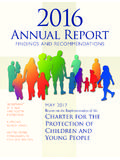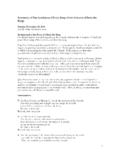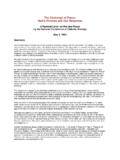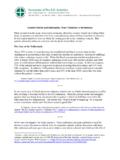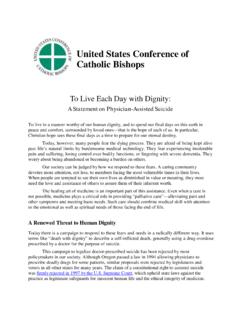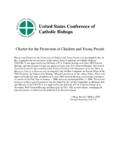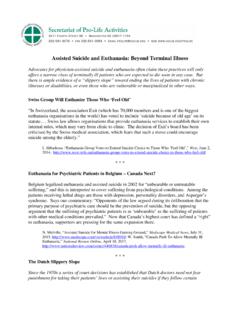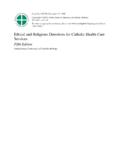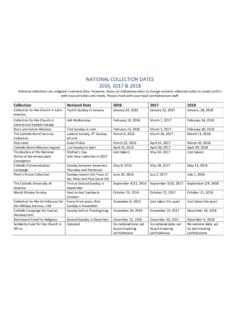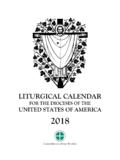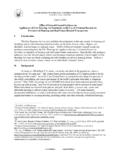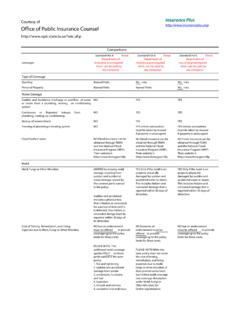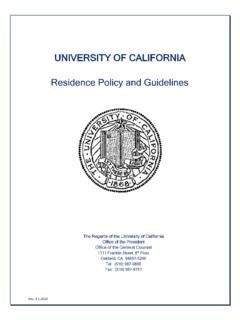Transcription of Office of the General Counsel - usccb.org
1 Office of the General Counsel 3211 FOURTH STREET, NE WASHINGTON, DC 20017-1194 202-541-3300 FAX 202-541-3337. June 8, 2017. TO: Subordinate Organizations under usccb Group Ruling (GEN: 0928). SUBJECT: 2017 Group Ruling FROM: Anthony Picarello, General Counsel (Staff: Matthew Giuliano, Assistant General Counsel ). _____. This memorandum relates to the annual Group Ruling determination letter issued to the United States Conference of Catholic Bishops ( usccb ) by the Internal Revenue Service ( IRS ), the most recent of which is dated June 2, 2017, with respect to the federal tax status of subordinate organizations listed in the 2017 edition of the Official Catholic Directory ("OCD"). 1. As explained in greater detail below, this 2017 Group Ruling determination letter is important for establishing: (1) exemption of subordinate organizations under the usccb Group Ruling from federal income tax; and (2) deductibility of contributions to such organizations for federal income, gift, and estate tax purposes.
2 The 2017 Group Ruling determination letter is the latest in a series that began with the original determination letter of March 25, 1946. In the original 1946 letter, the Treasury Department affirmed the exemption from federal income tax of all Catholic institutions listed in the OCD for that year. Each year since 1946, in a separate letter, the 1946 ruling has been reaffirmed with respect to subordinate organizations listed in the current edition of the OCD. 2. The annual group ruling letter clarifies important tax consequences for Catholic institutions listed in the OCD, and should be retained for ready reference. Group Ruling letters from prior years establish tax consequences with respect to transactions occurring during those years. Responsibilities under Group Ruling. Diocesan officials who compile OCD information for submission to the OCD publisher are responsible for the accuracy of such information. They must ensure that only qualified organizations are listed, that organizations are listed under their correct legal names, that organizations that cease to qualify are deleted promptly, and that newly- qualified organizations are listed as soon as possible.
3 1. A copy of the most recent Group Ruling determination letter and this memo may be found on the usccb website at under Tax and Group Ruling.. 2. Catholic organizations with independent IRS exemption determination letters are listed in the 2017 OCD. with an asterisk (*), which indicates that such organizations are not included in the Group Ruling. EXPLANATION. 1. Exemption from Federal Income Tax. The latest Group Ruling determination letter reaffirms that the agencies and instrumentalities and educational, charitable, and religious institutions operated, supervised or controlled by or in connection with the Roman Catholic Church in the United States, its territories or possessions that appear in the 2017 OCD and are subordinate organizations under the Group Ruling are recognized as exempt from federal income tax and described in section 501(c)(3) of the Code. The Group Ruling determination letter does not cover organizations listed with asterisks or any foreign organizations listed in the 2017 OCD.
4 Verification of Exemption under Group Ruling. The latest Group Ruling determination letter indicates that most subordinate organizations under a group tax exemption are not separately listed in Exempt Organizations Select Check ( EO Select Check ) or the Exempt Organization Business Master File extract ( EO BMF ), both of which are available on As a result, many subordinate organizations included in the usccb Group Ruling are not included in various online databases ( , GuideStar) that are derived from the EO BMF. This does not mean that subordinate organizations included in the Group Ruling are not tax exempt, that contributions to them are not deductible, or that they are not eligible for grant funding from corporations, private foundations, sponsors of donor-advised funds or other donors that rely on online databases for verification of tax-exempt status. It does mean that a Group Ruling subordinate may have to make an extra effort to document its eligibility to receive charitable contributions.
5 The Group Ruling determination letter states that donors may verify that a subordinate organization is included in the Group Ruling by consulting the Official Catholic Directory or by contacting the usccb directly. It also states that the IRS does not verify inclusion of subordinate organizations under the Group Ruling. Accordingly, neither subordinate organizations nor donors should contact the IRS to verify inclusion under the Group Ruling. Subordinate organizations should refer donors, including corporations, private foundations and sponsors of donor-advised funds, to the specific language in the Group Ruling determination letter regarding verification of tax-exempt status, and to IRS Publication 4573, Group Exemptions, available on the IRS website at 3 Publication 4573 explains that: (1) the IRS does not determine which organizations are included in a group exemption; (2). subordinate organizations exempt under a group exemption do not receive their own IRS.
6 Determination letters; (3) exemption under a group ruling is verified by reference to the official subordinate listing ( , the Official Catholic Directory); and (4) it is not necessary for an organization included in a group exemption to be listed in EO Select Check or the EO BMF. Although not required, organizations in the Group Ruling may be included in the EO BMF, and consequently, online databases derived from it. 3. For an illustration of how exemption verification works, refer to Information for Donors and Grantmakers on the usccb website at under Tax and Group Ruling.. 2. 2. Public Charity Status. The latest Group Ruling determination letter recognizes that subordinate organizations included in the 2017 OCD are public charities and not private foundations under section 509(a) of the Code, but that all subordinate organizations do not share the same public charity status under section 509(a). Therefore, although the usccb is classified as a public charity under sections 509(a)(1) and 170(b)(1)(A)(i), that public charity status does not automatically extend to subordinate organizations covered under the Group Ruling.
7 Verification of Public Charity Status. Each subordinate organization in the Group Ruling must establish its own public charity status under section 509(a)(1), 509(a)(2) or 509(a)(3) as a condition to inclusion in the Group Ruling. Certain types of subordinate organizations included in the Group Ruling qualify as public charities by definition under the Code. These are: churches and conventions or associations of churches under sections 509(a)(1). and 170(b)(1)(A)(i) (generally limited to dioceses, parishes and religious orders);. elementary and secondary schools, colleges and universities under sections 509(a)(1) and 170(b)(1)(A)(ii); and hospitals under sections 509(a)(1) and 170(b)(1)(A)(iii). Other subordinate organizations covered under the Group Ruling may qualify under the public support tests of either sections 509(a)(1) and 170(b)(1)(A)(vi) or section 509(a)(2). Verification of public charity classification under either of the support tests generally can be established by providing a written declaration of the applicable classification signed by an officer of the organization, along with a reasoned written opinion of Counsel and a copy of Schedule A.
8 Of Form 990/EZ, if applicable. Large institutional donors, such as private foundations and sponsors of donor-advised funds, may require this verification prior to making a contribution or grant to be assured that the grantee is not a Type III non-functionally integrated supporting organization. 4 A subordinate organization included in the Group Ruling may want to file Form 8940, Request for Miscellaneous Determination, with the IRS to request a determination whether it is a publicly supported charity described in sections 509(a)(1) and 170(b)(1)(A)(vi) or section 509(a)(2), or is a Type I or II supporting organization, in order to satisfy private foundations and sponsors of donor-advised funds regarding its public charity status. 3. Deductibility of Contributions. The latest Group Ruling determination letter assures donors that contributions to subordinate organizations listed in the 2017 OCD are deductible for federal income, gift, and estate tax purposes.
9 4. Unemployment Tax. As section 501(c)(3) organizations, subordinate organizations covered by the Group Ruling are exempt from federal unemployment tax. However, individual states may impose unemployment tax on subordinate organizations even though they are exempt from federal unemployment tax. Please consult a local tax advisor about any state unemployment tax questions. 4. See Notice 2014-4, 2014-2 (January 6, 2014). 3. 5. Social Security Tax. All section 501(c)(3) organizations, including churches, are required to withhold and pay taxes under the Federal Insurance Contributions Act (FICA) for each employee. 5 However, services performed by diocesan priests in the exercise of their ministry are not considered employment for FICA (Social Security) purposes. 6 FICA should not be withheld from their salaries. For Social Security purposes, diocesan priests are subject to self-employment tax ("SECA") on their salaries as well as on the value of meals and housing or housing allowances provided to them.
10 7 Neither FICA nor income tax withholding is required on remuneration paid directly to religious institutes for members who are subject to vows of poverty and obedience and are employed by organizations included in the Official Catholic Directory. 8. 6. Federal Excise Tax. Inclusion in the Group Ruling has no effect on a subordinate organization's liability for federal excise taxes. Exemption from these taxes is very limited. Please consult a local tax advisor about any excise tax questions. 7. State/Local Taxes. Inclusion in the Group Ruling does not automatically establish a subordinate organization's exemption from state or local income, sales or property taxes. Typically, separate exemptions must be obtained from the appropriate state or local tax authorities in order to qualify for any applicable exemptions. Please consult a local tax advisor about any state or local tax exemption questions. 8. Form 990/EZ/N. All subordinate organizations included in the Group Ruling must file Form 990, Return of Organization Exempt from Income Tax, Form 990-EZ, Short Form Return of Organization Exempt From Income Tax, or Form 990-N, e-Postcard, unless they are eligible for a mandatory or discretionary exception to this filing requirement.
